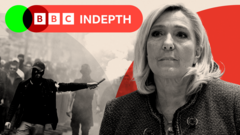Marine Le Pen's disqualification from the 2027 presidential race has stirred intense reactions within France's far-right circles, unraveling a complex tapestry of political drama that could redefine the future of the National Rally and its leadership.**
Marine Le Pen Banned from 2027 Election: A Turning Point for France's Far Right**

Marine Le Pen Banned from 2027 Election: A Turning Point for France's Far Right**
The court ruling barring Marine Le Pen from future elections ignites outrage among her supporters and reshapes the French political landscape.**
The announcement that Marine Le Pen, the leader of France’s far right National Rally (RN), has been barred from the 2027 presidential election has sent shockwaves throughout the French political landscape. The court's ruling, which embodies a harsh response to her party's involvement in a corruption scandal, has been met with outrage from her supporters, framing Le Pen as a political martyr.
Addressing the contentious ruling, Le Pen and her allies have immediately branded the judiciary's actions as a violation of democracy, claiming that the very institutions of the nation have been distorted to stifle their ambitions. "The system has unleashed a powerful attack against us, indicating we are gaining ground," Le Pen proclaimed defiantly, drawing parallels with other political figures who have faced judicial challenges.
Despite the fervent pushback from the RN, a recent poll suggested that many in the French public are not sympathetic to Le Pen’s plight, with only 31% deeming the court's decision unjust. This discrepancy highlights a complex dynamic where support for Le Pen does not translate universally into condemnation of her legal consequences. The reality of the situation reveals a population that may appreciate Le Pen's political stance while still holding her accountable for wrongdoing.
Prime Minister François Bayrou's comments reflect anxiety within the centrist government about the ruling's potential impact on the fragile political coalition, as they navigate the pressing issue of far-right growth. As the political climate remains volatile with the presidential elections still two years away, the uncertainty looms over how the RN will respond to this legal setback.
Among the discussions surrounding Le Pen's future is the question of succession within the National Rally. Young politician Jordan Bardella is being looked at as an emerging leader if Le Pen's appeal fails to reverse her disqualification. His ability to resonate with younger voters could present a new dimension to the RN's strategies moving into 2027.
The events surrounding the court decision have also revealed broader tensions within the French political elite, who face accusations of hypocrisy for their previous support of more stringent anti-corruption laws that now affect one of their own. As the political narratives unfold, Le Pen’s trajectory will be crucial, but the framework of her party's strategy must evolve to avoid becoming stagnant under the weight of scandal.
Looking ahead, the RN's commitment to a populist platform that critiques established political structures may continue to invigorate its base. However, the real test will come in translating this outrage into electoral success and whether the electorate will embrace corruption allegations as a valid reason for disqualification rather than political maneuvering.
In a landscape where Le Pen has been a constant since 1988, the fundamental question remains: will she emerge as a symbol of change for the far right, or will she be remembered as just another inconclusive bidder for the presidency who succumbed to the corruption narrative? The unfolding chapters of her political journey in France are poised to be pivotal.



















